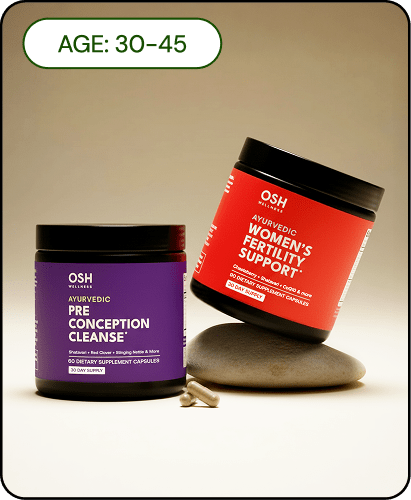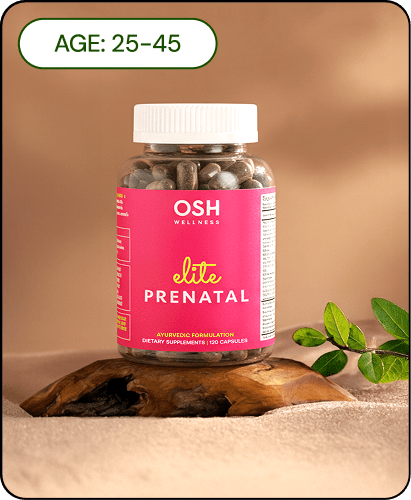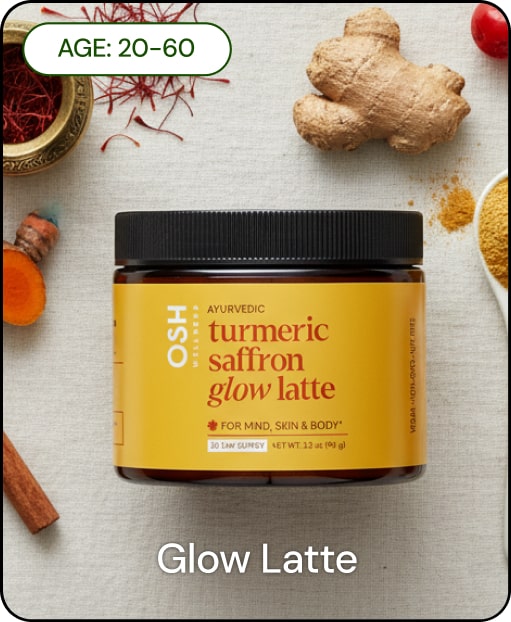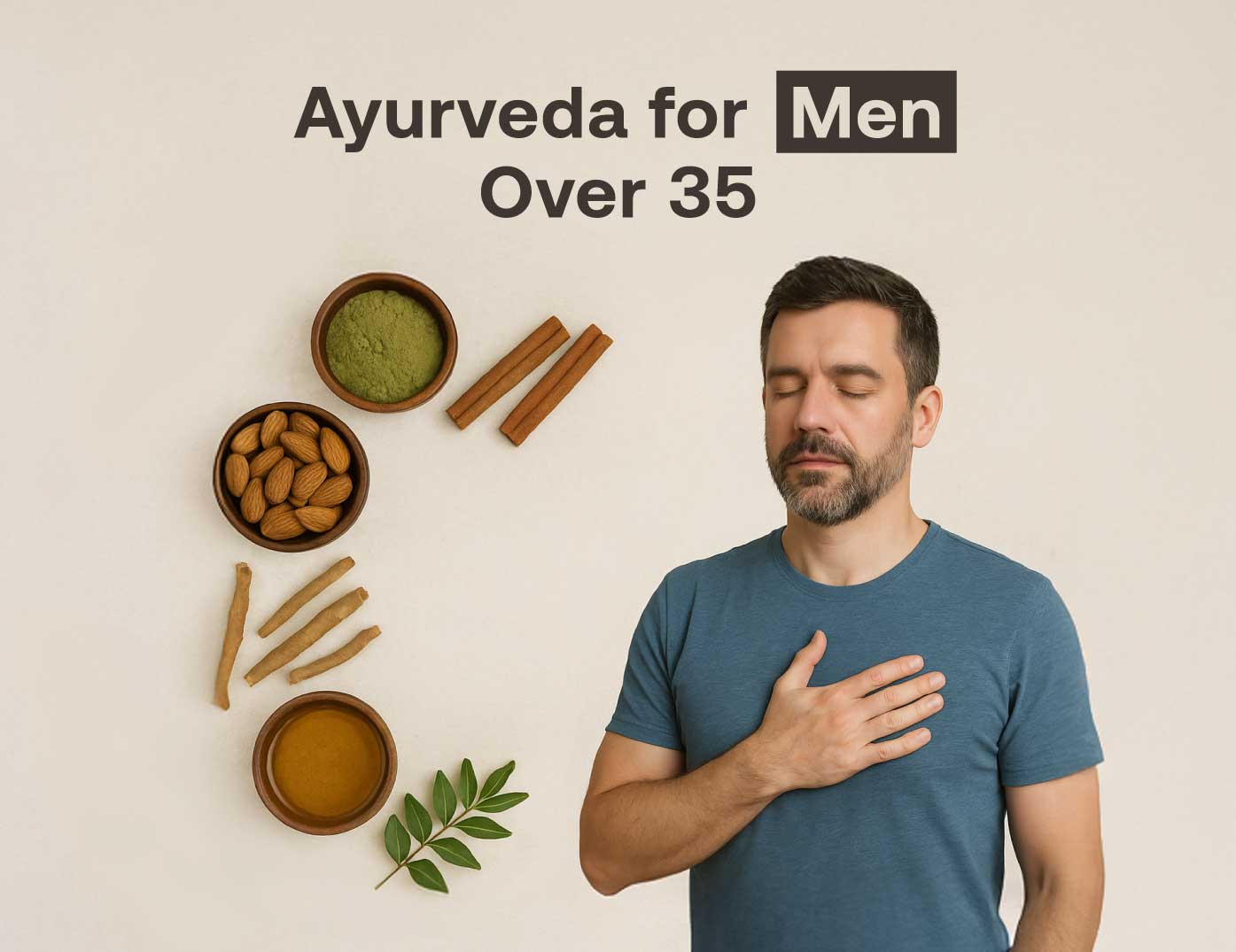Table of contents
As men age, particularly after 35, they often face increasing stress, fatigue, and vitality-related challenges . Ayurveda, the ancient Indian system of medicine, provides a comprehensive approach to wellness by emphasizing personalized care and inner balance. This guide explores how Ayurvedic practices can empower men to tackle age-related issues by integrating traditional wisdom with modern health solutions. By understanding dosha balance and adopting holistic lifestyle adjustments, men can significantly enhance their quality of life.
Introduction to Ayurveda and Its Relevance

Ayurveda offers profound insights into men's health through a personalized and holistic philosophy aligned with specific life stages. At its core lies the concept of doshas, Vata, Pitta, and Kapha, embodied physiological and psychological traits that guide personalized health recommendations [1].
For men over 35, Ayurveda gains significant relevance, addressing issues such as hormonal imbalance, chronic stress, diminished energy, and elevated cardiovascular risk. These concerns often stem from underlying doshic imbalances, which are addressed through a diagnostic evaluation that informs diet, herbal therapy, and lifestyle choices [2].
Personalized care is key in Ayurvedic practice. Rather than offering general solutions, Ayurveda creates individualized plans tailored to a person’s constitution and current condition. Key interventions include yoga, mindfulness, and potent adaptogens like Ashwagandha, which support mental resilience and physical health [3].
In today’s health-conscious world, Ayurveda stands out by not just alleviating symptoms but igniting long-lasting well-being rooted in individual vitality and life dynamics [4].
The Doshas: Vata, Pitta, and Kapha

The Ayurvedic system of doshas, Vata, Pitta, and Kapha, presents a structure for understanding individual traits and health tendencies. These doshas influence everything from digestion and energy to emotional balance and disease susceptibility.
Vata (Air + Ether): Controls movement, nervous system activity, and communication. When imbalanced, it causes anxiety, insomnia, and poor digestion [5].
Pitta (Fire + Water): Governs digestion, metabolism, and temperature regulation. Excess Pitta can cause irritability, skin inflammation, and acid reflux [6].
Kapha (Earth + Water): Provides structure and stability. Imbalance may lead to lethargy, water retention, and emotional dullness [7].
Understanding one's dosha leads to tailored strategies for diet and lifestyle. For instance:
Vata types benefit from warm, grounding meals.
Pitta types should favor cooling, hydrating foods.
Kapha individuals thrive on light, spicy fare [8].
Embracing these insights enhances bodily harmony and boosts stress resilience, laying the foundation for optimal male health through individualized care.
Understanding Stress and Fatigue in Men Over 35

Stress and fatigue are increasingly prevalent among men after 35, significantly impacting their physical vitality and mental clarity. Multiple surveys indicate that nearly 26% of men report persistent fatigue lasting over six months [9].
Biologically, chronic stress affects the hypothalamic-pituitary-adrenal (HPA) axis, impairing the body’s ability to regulate cortisol. This leads to sluggish mornings, exhaustion, and a lowered defense against stressors [10]. Even though “adrenal fatigue” as a term remains debated, there's consensus that prolonged stress disrupts hormonal rhythms [11].
Psychologically, sustained stress reduces motivation, increases anxiety, and hampers cognitive functioning, especially in men aged 35 to 44, nearly half of whom report overwhelming daily stress [12]. Left unchecked, these factors degrade overall well-being and social interaction.
Ayurvedic Strategies for Stress Management

Ayurveda offers a multifaceted strategy for stress relief, blending herbal therapy, yoga, meditation, and pranayama.
Ashwagandha: Reduces cortisol and enhances energy and mood balance [13].
Brahmi: Supports memory and calms mental unrest, ideal for cognitive health [14].
Kapikachu: Provides neurological support due to its L-DOPA content, assisting stress recovery [15].
Alongside herbs, practices like yoga, meditation, and pranayama play essential roles:
Yoga: Calms the mind and improves circulation.
Meditation: Promotes mindfulness and reduces emotional reactivity.
Pranayama: Regulates breath to control the nervous system’s stress response [16].
This integrative system addresses both body and mind, fostering deeper resilience and stability over time.
Nutritional Wisdom in Ayurveda

Ayurvedic nutrition tailors food choices to dosha constitution, prioritizing fresh, seasonal foods to support vitality and hormonal balance.
Vata: Emphasizes warm, cooked foods like stews and grains to prevent dryness and fatigue [17].
Pitta: Benefits from hydration-rich, cooling options such as melons and cucumbers during heat-prone seasons [18].
Kapha: Requires spicy, light meals to combat sluggishness and boost activity.
Whole, unprocessed foods help reduce inflammation and stabilize hormones [19]. Ayurvedic seasonal eating, such as grounding meals in autumn or cooling foods in summer, supports internal balance and digestive efficiency [20]
Detoxification through Panchakarma is also integral, involving light diets and herbal tonics to rejuvenate internal systems and cells [20].
Incorporating herbs like Ashwagandha and adopting mindful eating make these practices particularly effective for enhancing reproductive and overall health.
Integrating Ayurveda with Modern Wellness Practices

Today’s wellness landscape increasingly blends Ayurvedic and modern medical practices to optimize outcomes. For example, a 2023 clinical trial showed that diabetic patients using Ayurvedic therapies alongside conventional care reduced their HbA1c levels by 20% more than those on standard treatments alone [21].
Successful integration examples include:
Indian hospitals with Ayurvedic consultants working with modern clinicians.
Western cancer centers offering Ayurveda-inspired yoga and meditation for symptom management [22].
Corporate wellness programs embracing Ayurvedic coaching and diets [23].
Many experts argue that personalized Ayurvedic planning, when combined with modern diagnostics, provides robust patient-centered strategies [24]. Challenges like standardization are being addressed through ongoing studies supporting its reliability for metabolic and stress-related disorders.
This fusion of traditional and scientific modalities illuminates a new path toward holistic health that appeals to modern men seeking comprehensive well-being.
Relevant Products
Explore Osh Wellness Men's Fertility Support , an Ayurvedic product formulated to enhance vitality, hormonal balance, and overall reproductive health. Harnessing time-tested herbs like Ashwagandha, this supplement is ideal for men integrating natural wellness into their daily routine.
Conclusions

Incorporating Ayurvedic principles into daily life offers transformative health benefits for men over 35. By focusing on doshic balance, stress reduction, and nutritional wisdom, individuals can create sustainable improvements in vitality and wellness. As modern healthcare increasingly aligns with ancient holistic insights, Ayurvedic guidance serves as a valuable anchor for achieving long-term well-being.
FAQs
What is Ayurveda and how does it apply to men's health?
Ayurveda is a holistic healing system that uses personalized strategies based on mind-body types known as doshas to support men's well-being and life transitions.
How can I determine my dosha?
You can visit an Ayurvedic practitioner or use online quizzes provided by certified Ayurvedic institutes for your initial dosha assessment.
What are the best herbs for stress management?
Ashwagandha, Brahmi, and Shankhpushpi are among the top Ayurvedic herbs for managing stress and enhancing mental clarity.
Is Ayurveda safe alongside conventional medicine?
Yes, Ayurveda can complement standard treatments, but you should consult both your healthcare provider and an Ayurvedic specialist for an integrated approach.
How long does it take to see results from Ayurvedic practices?
Depending on your condition, dosha, and adherence, positive results can be seen within a few weeks to a few months of consistent practice.
Sources
1: Oxford Academic - Ayurvedic Approach to Men's Health
2: Art of Living - Ayurveda for Men's Health: 6 Simple Practices for a Powerful Life
3: Banyan Botanicals - Ayurvedic Virility and Vitality
4: LifeSpa - The Ancient Science of Men's Health: Understanding the Causes of Imbalance
5: Healthline - Vata Dosha, Pitta Dosha, Kapha Dosha
7: Art of Living Retreat Center - Know Yourself by Knowing Your Ayurvedic Body Type
8: Ayur Clinic - Vata, Pitta, Kapha: Ayurveda & Mental Health
9: PMC - Perceived Stress, Fatigue, and Quality of Life
10: PMC - The Relationship Between Stress and Fatigue
11: PMC - Psychological Stress and Health Outcomes
12: APA - Men and Stress: A Growing Concern
14: Shadanga - Say Goodbye to Stress: Ayurvedic Remedies for Anxiety and Sleep
15: Swasthya Ayurveda - Ayurvedic Therapies for Stress Relief
16: Ayuryoga Ashram - Stress Management Therapy
17: One World Ayurveda - 6 Ayurvedic Tips to Support Men's Reproductive Health
18: Art of Living Retreat Center - Relationship Between the Doshas and the Seasons
20: Ayurveda For All - Ayurvedic Diet for Detox
21: Sai Ayush Ayurveda - Ancient Ayurvedic Principles in Modern Wellness
22: Journal of Interdisciplinary Education Research - Integrating Ayurveda with Modern Wellness
23: Faster Capital - Integrating Ayurveda with Modern Healthcare Systems
24: Medreport Foundation - The Ayurveda Effect in Modern Healthcare








